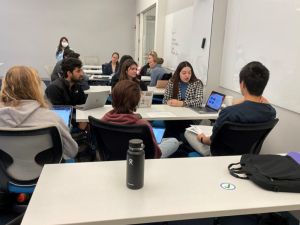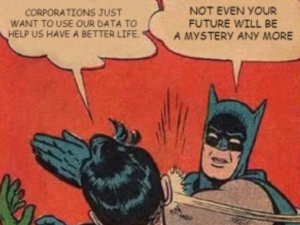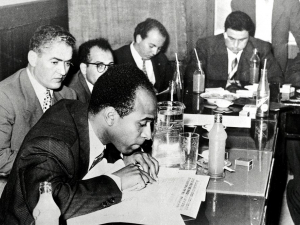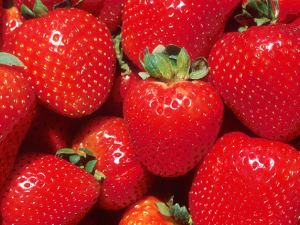The best decision I made last semester was to apply to become a Playful Pedagogy Fellow. It has always been a goal of mine to continuously refine and elevate my craft as a teacher, and the Playful Pedagogy Fellowship (PPF) was a new, exciting stop on that path. I have many things to say about PPF, but I will limit myself to three: First, it should be made clear that Nan Mullenneaux is a genius. I have been singing Nan's praises since the day that I met her. She is welcoming, kind, and generous. She is an encyclopedia… read more about Candis Watts Smith, Professor of Political Science »
The playful pedagogy workshop reminded me that learning is fun and dynamic and that there are many ways to reach our learning outcomes. I found myself incorporating playful pedagogy tactics frequently in my Spanish classes, employing mainly activities focused on active listening, representation of ideas and opinions through the arts, and games to make your peers look and feel good to lower students' affective filters. My students reflected during their mid-semester and final reflections that some of the… read more about Rebecca Ewing, Lecturing Fellow of Romance Studies »
"I especially appreciate Nan—our wonderful and passionate leader—who always brought energy and thoughtful preparation to each meeting. She inspired me to see that language teaching can be both “serious” and “fun” at the same time."-Playful Pedagogy Fellow 24-25 read more about Ya-Chuan Chou, Playful Pedagogy Fellow »
"Working with an established cohort to explore the possibilities that improv techniques could bring to our pedagogy was a very enriching experience, and Nan’s guidance and leadership through this process was invaluable—her knowledge and experience, but also her warmth and support and creativity throughout." - Playful Pedagogy Fellow '24 read more about Laura Florand, Playful Pedagogy Fellow »
“Under Nan’s skilled guidance, and because I trust her and her vision, I began to believe that I could ask my students to try things out, to approach collaboration, creation, and communication as a series of experiments, which when all is said and done, is how we learn, and especially how we learn languages.”Playful Pedagogy Fellow ‘25 read more about Melissa Simmermeyer, Playful Pedagogy Fellow »
Working with an established cohort to explore the possibilities that improv techniques could bring to our pedagogy was a very enriching experience, and Nan’s guidance and leadership through this process was invaluable—her knowledge and experience, but also her warmth and support and creativity throughout.While generally I prefer working with Fellows drawn from multiple departments and to step outside my usual language silo, this might be one case where I would recommend a fellows with a language focus if possible, just… read more about Laura Florand, Senior Lecturer of Romance Studies »
I thought it was important to remark on my experience as a Playful Pedagogy Fellow, 2025. I have always really enjoyed improv, and so admire the players on Whose Line Is It Anyway, for example. I always knew that when these players participated in improv, that they were learning together, and making meaning together. I love to see that happen, and I often laugh out loud, way louder than I should. It makes me happy to suspend my disbelief, and I am able to “buy in” to whatever the premise is, no questions asked. I learn so… read more about Melissa Simmermeyer, Senior Lecturer of Romance Studies »
I’ve really enjoyed this series of Playful Pedagogy workshops. Our team members came from diverse backgrounds, and we worked together to brainstorm and design more engaging classroom activities. I especially appreciate Nan—our wonderful and passionate leader—who always brought energy and thoughtful preparation to each meeting. She inspired me to see that language teaching can be both “serious” and “fun” at the same time.My notebook is now filled with game ideas that, with just a few small adaptations, I can easily use in my… read more about Ya-Chuan Chou, Lecturing Fellow in the Department of Asian & Middle Eastern Studies »
Development time with the Bacca fellows afforded me ample informal, adaptive time to jazz-prepare in tandem with my class's year-long laboratory improvisations.Being part of the Bacca community grew my developments in laboratory learning in my classes. Our meetings gave sanctuary to common reflection time whose energy together gathered interia to concoct new ideas from our buffet of projects. Our collective thinking drew upon the wealth of teaching experience in the room and disciplinary insights… read more about The Dialog Laboratory »
My colleagues gave me the space, time, and tools to explore and be inventive with new ways of teaching and learning. I became the student, pressing beyond my comfort level to grow in a community of supportive colleagues.I was so nervous during our first LAMP workshop. Faculty dedicated to bringing the arts and media into their classrooms gathered around the table. I feared they would soon find out creativity was not my strong suit. They did, but responded with reassurance and encouragement. My… read more about Loosing Content, Gaining Community »
Designing a new course is always exciting and energizing. And it is also labor-intensive and anxiety producing. Being part of the Bacca Fellowship and having the other fellows “in my corner” as I went into teaching Performing Brazil for the first time this fall made all the difference. Designing a new course is always exciting and energizing. And it is also labor-intensive and anxiety producing. No matter how hard you try to have everything worked out and ready to go by the start… read more about Performing Pedagogy: Creative Engagement and Collaborative Learning in a course on Brazil »
For many students, Spanish 205, a service learning course, is their first experience balancing college course work and the commitment of service. These students work with families at the Durham Community Food Pantry or tutor elementary and middle schoolers at La Iglesia Emmanuel.When I applied for the Bacca Fellowship, I thought I would be teaching a course on Caribbean Diaspora. However, I soon found out that I would not be teaching the course for a while, so I would have to change what kind of… read more about Dynamic Video Projects in a Community Engaged Course »
My project used AI to create a variety of role-playing exercises for Hindi Language that focused on authentic phrasing.If taking your students to the Taj Mahal isn't possible, why not bring the Taj Mahal to them? This concept inspired me to integrate VR into my class, allowing students to engage in meaningful conversations through role-plays. I designed role-plays for elementary and intermediate Hindi students to enhance their spoken Hindi and cultural competence. In this blog, I will explain step-by-step my role-play model… read more about Preparing for Real Life Through AI-Generated Role-play »
My project as a Bacca Fellow was to design multimedia assignments that draw students into the historical, aesthetic, and political currents shaping the Italian diva’s many afterlives.Designing a new course on the diva might sound like an indulgence in glamour—and it is—but it’s also a rigorous invitation into cultural criticism. As part of my Bacca Fellowship, I developed “The Diva: A Cultural Saga,” an undergraduate seminar that traces the diva’s many incarnations—from the sirens and muses of classical myth and the soprano… read more about Who’s Afraid of the Diva?: A Course in Celebrity, Critique, and Creative Practice »
I started the semester with a desire to get students engaged in the materiality of writing. What I got out of the class, and this fellowship, was more than I could ask for.I am not going to lie—it has been a difficult academic year. Studying reproductive rights and health is often difficult but important work. This year, and the Spring semester specifically, my students and I had to face the rolling back of fundamental health care rights, stripping of information from public health sites, and an increasing fear and doubt… read more about From Archives to Activism: Building a Scaffolded Approach to Multimodal Composition »
The Bacca Fellowship transformed my vision for an arts-based makerspace from a simple request for space into a comprehensive pedagogical framework.The Bacca Fellowship transformed my vision for an arts-based makerspace from a simple request for space into a comprehensive pedagogical framework. My initial proposal sought to establish a dedicated area where students could engage with course material through tactile, creative processes - where making becomes a mode of thinking rather than production. What made this evolution… read more about Making Meaning Beyond Words: Launching a Teaching Makerspace »
A Spanish language writing instructor encourages her students to rethink the formal essay. In Spring 2024, in lieu of a traditional final essay in Spanish 301: Advanced Spanish Writing, I experimented with a different form: a visual (also known as graphic or multimodal) essay. First-year students, sophomores, juniors and seniors were enrolled in the class. Three planned to major in Spanish, while others were finishing their language requirement. All of them entered at an intermediate-mid or intermediate-high level of… read more about On Making Knowledge Visible: The Multimodal Essay in a Writing Class »
Most of my students will not become scholars of Italian language, linguistics, literature or related fields. While I naturally wish to instill in them a love of the language and culture, my larger objectives are the honing of skills and mindsets which connect them to a broader world and improve their ability to communicate in any language and to pursue study of any subject. I want them to understand the incremental nature of learning, and to increase their agency in the process, identifying their individual strengths and… read more about Pedagogical Tensions in the Student-Centered Language Classroom: Fostering Choice and Creativity in an Elementary Language Course. »
Imagine a spacetime bubble of collaborative creativity you enter regularly, where everyday constraints are suspended.You have the luxury to converse with other faculty about some aspect of your pedagogical practice that’s been nagging at you for a while, which you have yet to figure out. I had taught Modernism across the Arts for several years when I applied for the Bacca fellowship, and my idea was to come up with a comprehensive final assignment that would require group work, a project (perhaps) involving technology that… read more about Modernism Across the Arts »
Reconceptualizing my syllabus, discarding the contractual document outlining assignments, policies, and penalties, in favor of a liquid syllabus designed in Story Maps transformed student learning.“Black Girlhood in French Cinema” is a seminar course that examines the entanglement of race, gender, and age through the representation of Black girl protagonists in French films. Two core questions underlie our class discussions for the semester: 1) What place have Black girls historically occupied in the construction of the… read more about The Liquid Syllabus: Cultivating Student Agency »
Language portfolios invite students to extend their learning beyond the classroom through a variety of multimedia adventures.What do students actually take away from their time in a language classroom, and how do they grow as people in the process? This year’s BACCA fellowship gave me the opportunity to explore avenues for passing this question along to the students themselves by inviting them to identify meaningful content and document their own growth. The primary tool for drawing students into this journey was the… read more about Exploratory Journeys: The Versatility of Language Portfolios »
Eustace, a 3-year-old Coquerel’s sifaka lemur, was literally bouncing off the walls, or trees, to be accurate, on a clammy October 2020 morning at the Duke Lemur Center in Durham, North Carolina. As his long-suffering father, Marcus Aurelius, and ever-tolerant mother, Rodelinda, tried to rest after their mid-morning snack, their rambunctious son assailed them with head bops and tugs on their tails amidst his own backflips. Young primates are playful! This is both why monkey bars are called “monkey” bars and why our own… read more about Learning is winning: Bringing a neglected form of primate learning, play, into the classroom with board games! »
Making Space for Student Voices in Multilingual Public Policy Modules.Part of my work as a professor of French Studies is to help students think more clearly about Public Policy in other countries. Public Policy is what a governing body creates on behalf of its public, in response to a problem or issue that comes before it. Governments make policy about schools, schools make policy about education, and so on. France’s policies not only perplex students, but they downright confound them, whether we are talking about France’s… read more about Developing Public Policy Courses in Five Different Languages, or How Do You Manage a Pedagogical Experiment? »
Improv games and long-form listening in a digital writing class.As LAMP Intern in Innovative Pedagogy, I’ve had the privilege of observing and participating in the Bacca Fellows’ learning community for the last two years. Here’s one takeaway I can share from Bacca experimentation in my teaching this semester: it’s ok, in fact, it can be great, to move away from a content-competency model and to focus instead on creative activities and relational bonding in the classroom.I’m teaching a digital literacy and… read more about Opening up to “Now” in a Multimedia Composition Class »
Getting closer to life in an existentialism lecture reworked as a double seminar.I applied for the Bacca Fellowship planning to teach a seminar on autofiction, focusing on recent writers such as Annie Ernaux, Karl Ove Knausgaard, Rachel Cusk, and Sheila Heti, who all, in different ways, try to get as close to life as possible. I had only taught this seminar once before, and I wanted to overhaul it. The Bacca Fellowship seemed the perfect opportunity to rethink the course.But the meaning of life appears to be back in fashion… read more about The Meaning of Life Is Back in Fashion: Existentialist Oversubscription »
AI-responsive writing assignments transition from homework essays to writing by hand in the classroom.The 2022–2023 Bacca Fellowship Program has given the three of us space to plan, collaborate, stumble, and forge ahead, in community with peers as we worked to phase in new writing assignments to our Spanish teaching. In lieu of composing essays on the computer, students in elementary and intermediate level Spanish classes now write by hand in class every other week, without access to any outside resources, for an average… read more about From Pixels to Pens: Revamping Writing in a Spanish Language Curriculum »
Fostering a sense of home in language through Spanish-learners’ daily memory workWhen I tell someone I teach Spanish, I am usually met with one of two reactions: "I used to know Spanish, but I've forgotten after all these years" or a bewildered "¿Por qué?" I often think about what unifies my response to those two reactions, and I've found that it's memory. There is a sudden case of amnesia that overcomes Spanish language learners once they stop using the language, bespeaking a lack of connection to the target language. And… read more about Where Does Spanish Go? Developing a Homing Device for Forgotten Language »
Assigning Writing Studio Consultants readings about frustrated writers—by the authors Nam Le, Lucy Ives, Geoff Dyer, and Bernard Malamud—to complement trainings in peer learning methods. “In the process of turning from [fiction], we’ve accused it of appropriation, colonization, delusion, vanity, naiveté, political and moral irresponsibility,” writes Zadie Smith in a 2019 essay. Where the “conflicted, the liars, the self-deceiving, the willfully blind, the abject, the unresolved, the… read more about The Character(s) of Pedagogical Training »
In responding to works of literature or film, what responsibilities arise for readers, critics, students and teachers?For a few years I’ve been teaching a class in the English Department called Shakespeare Now and Then: Versions of The Winter’s Tale. The class begins with a slow read through Shakespeare’s late romance, act by act, scene by scene. Since it is a tragicomedy, we also explore the comic and tragic paths which it mixes and transforms within Shakespeare’s own canon. The rest of the class is taken up with… read more about Shakespeare Now and Then: Versions of The Winter’s Tale »

























